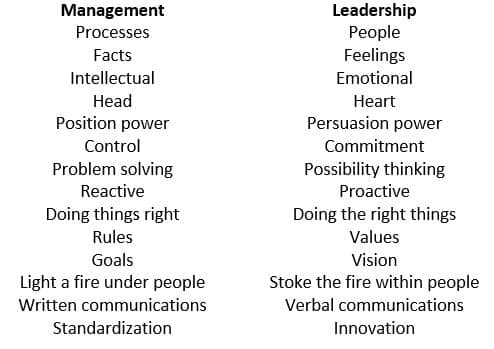One person wants to be a better manager. Another wants to be a better leader. Choosing to be “either” one “or” the other often leads to being neither.
Google “management skills” and “leadership skills” and you are likely to see various sources displaying skills assigned primarily, even exclusively, to each role. Take a look at this example:
What do you see with the skills as assigned?
Do these skills resonate with the kind of manager you desire to be? As a leader, are these the qualities you want in managers on your team, good only at written communication and not verbal, focused on rules and not values, being reactive, not proactive?
If, as a manager, you believe that your job is to control and not consider commitments, there’s a good chance that your go-to management tool might be a whip, physical or perceived. If, as a leader, you expect your managers to pay more attention to processes than people, your primary leadership action might be to interview new managers due to extremely high turnover.
A Difference in Scale, Not Skills

Leadership is about change. It’s about helping the organization define its vision, as well as take advantage of opportunities and avoid threats. It’s about challenging people to unleash their potential and step into uncharted territory. Management is about developing systems and processes that enable people to take dominion over chaos. Its role is to create a sense of order and constancy by designing plans and systems for monitoring progress and controlling outcomes for the purpose of efficiency. In our rapidly changing world, constancy and equilibrium can be deadly. The environments organizations find themselves in today is a bit like whitewater rafting.

Trying to run an organization with only leadership or management is like trying to cut a page with half a pair of scissors. Leadership and management are a matched set – both are needed to be effective.
The Path Forward: Dialogue
To have a conversation that empowers managers and leaders in their respective roles, and subsequently employees, I recommend dialogue. Dialogue goes beyond naming skills to exploring meanings. Meanings your colleagues generate and share matter, not Webster’s definition.
Realizing that the conversations of the organization create the environment within which people work, telling people what is and isn’t acceptable, makes it essential that both managers and leaders become masters of the conversational environment. Mastering the conversational environment means to be responsible for the conversations that exists within the organization. On behalf of possibility rather than business as usual, it means to generate a future-oriented context, to resolve future-defeating conversations, and to create relationships of trust and partnership. The skill of mastering the conversational environment can be learned and is the most fundamental skill that both managers and leaders need to successfully navigate today’s organizational worlds.
What’s the skill set you aspire to model?
Keep thinking.
Subscribe
Get Camille's latest posts!

